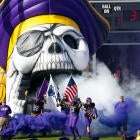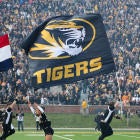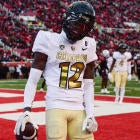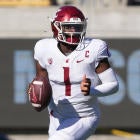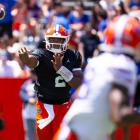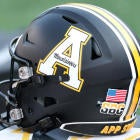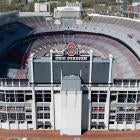Ten days into the Big 12's formal expansion process, we have entered some sort of theater of the absurd.
You might have noticed high-school graduate Justin Timberlake suddenly has become an official spokesman for the University of Memphis.
Memphis to the @Big12Conference... let's make this happen! https://t.co/MZyRPTAm8M
— Justin Timberlake (@jtimberlake) July 27, 2016
Pandering has reached a new level in North Carolina where politicians have hijacked Big 12 expansion for their own gain.
And, goodness, what was that all about last week when the Texas state president, chancellor, governor and lieutenant governor all lobbied for Houston on Twitter in the space of an hour?
This isn't a thoughtful expansion process, so much as a catwalk. Strut, smile, wave. Work it, Bearcats -- or Huskies or Bulls or Pirates.
Decorum be damned. Actually, it's damn embarrassing to watch some of these schools flash their wares like they're in a Bunny Ranch lineup.
"In terms of our own people, they're under enormous pressure because of the public nature of this," American Athletic
Conference commissioner Mike Aresco told CBS Sports on Thursday. "I wish it hadn't been so public. I can't speak for the Big 12 but even they may regret it being so public."
Aresco's AAC is the conference most likely to be impacted the most if/when the Big 12 pulls the expansion trigger. Ten of the league's 12 teams have at least been mentioned as possible candidates for the Big 12.
Since Big 12 expansion was announced July 19, BYU has emerged as the supposed leader in the clubhouse for one spot. Any other invites would almost certainly involve at least American school.
Multiple sources have said they believe the Big 12 will act soon, possibly before Labor Day so as not to distract from the football season.
It should be an interesting meeting of American athletic directors, then, during the conference's media days next week in Newport, Rhode Island.
No truth to the rumor potty breaks will be replaced by a text break for ADs getting back to Big 12 commissioner Bob Bowlsby.
You're nothing as a college president these days if you haven't released a statement essentially begging for a Big 12 invite. The overt politicking almost makes one yearn for the time of backroom deals.
"One of the writers the other day asked if I would have any hard feelings after this is all because of all the public statements," Aresco said. "Not at all ... No one can control what people say on the outside."
The three-year-old American formed in the last round of conference realignment as an amalgamation of the football-playing schools from the old Big East. Considering its current media rights contract expires in 2019-20 the 12-team American could break up long before it reaches puberty. That all depends on the Big 12.
One of Aresco's school, East Carolina, is in the middle of a planned direct-marketing Twitter roll out of the school's advantages. Did you know, for example, ECU has the highest average attendance of any non-Power Five school the last five years?
Looks like @ECUAthletics would be an excellent travel partner along with @WVUSports! pic.twitter.com/7FN5tKRS23
— ECUAthletics (@ECUAthletics) July 25, 2016
@Big12Conference, keep in mind that #PirateNation leads Group of 5 football attendance on avg. over past 5yrs! #ECUpic.twitter.com/DfzpuAN96l
— ECUAthletics (@ECUAthletics) July 22, 2016
More to the point, do you care? That average of 45,814 puts the Pirates 51st nationally.
"It's a fine line," said ECU associate AD Shelley Binegar, one of those in charge of the Twitter barrage. "You want to be very respectful of the conference you're currently in ... But when an opportunity presents itself your first loyalty is to your university, to your students, to your state to your town."
Poor Aresco. His football media days may be about everything but football.
"I've got a strategy for that," he said of the conference's annual lobster bake made famous during those Big East days. "We ordered 100 more lobsters and we're just going to have people continue to eat. If the media is eating, it can't ask any questions."
It's hard to blame any of these schools for looking beyond the horizon. This might be the last chance for any Group of Five school to enhance their brand, to fill their coffers in the Power Five.
Why not brazen, audacious pitches that makes used-car salesmen look shy?
"At the end of the day, I always go with [that] people like to see fun, happy things," Binegar said.
But is there an emoji for shamelessness?
"Joining the Big 12 is a game changer," Binegar countered. "This isn't a small thing. We feel good about it. We're doing it in a respectful, correct way."
There is probably no combination of available schools that makes the Big 12 better in football. But that's hardly the point. There is a possible $1 billion payday and a mathematically better chance of getting into the College Football Playoff, according to the Big 12's consultants.
SMU has the academics. Houston has the market. UCF has the upside. Memphis has FedEx CEO Fred Smith's riches. (Timberlake's cache is being a native of both Memphis and the boy-band movement.) BYU has something largely lacking in this discussion -- a tradition of big-time football.
Put all these schools together and you might have one viable candidate for the SEC or Big Ten.
Departing American schools would have to pay a reported $10 million buyout, while giving 27 months' notice before leaving. But anything can be negotiated -- or financed.
Leave it to The East Carolinian, the school's student newspaper, for not joining the cheerleading squad. It says ECU doesn't deserve to be in a Power Five league.
It raises a larger point. Only two Group of Five schools in the history of modern expansion (TCU, Utah) have gotten Power Five invites. The Big 12 could invite four from the American alone causing the latest domino effect in realignment as lesser conferences then backfill from other leagues.
That's nothing but an exercise in expansion Darwinism for the 10-team Big 12. The conference has watched high-rise condos rise up around it in the form of the ACC, SEC and Big Ten -- all with 14 football-playing members.
One man's poaching, though, is another man's payday. A clause negotiated in the last contract states the rightsholders must pay any new members the same as existing members. That would be about $30.4 million per new school phased in over time.
"We expect to exercise the full prerogatives of what we negotiated," Bowlsby said of the contract with ESPN and Fox.
This expansion revolution not only is being televised but written, tweeted, texted and probably periscoped in real time. You can't help but miss it.












